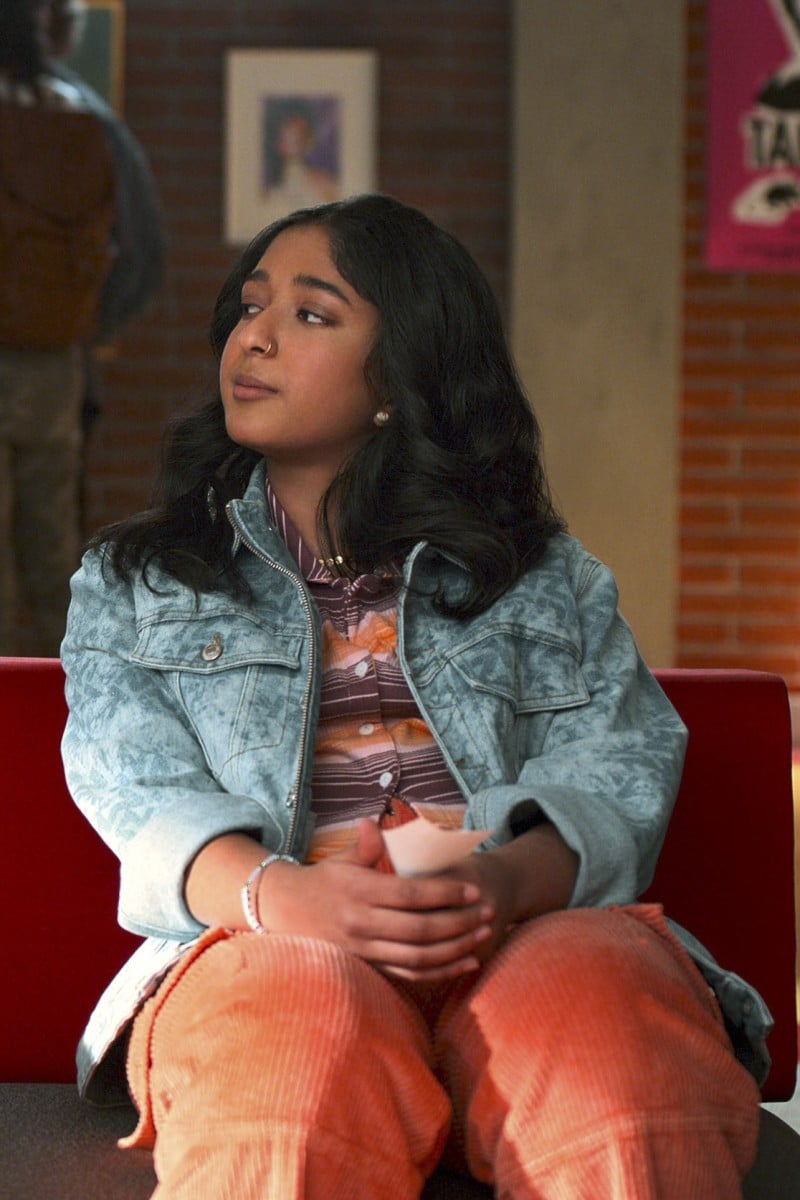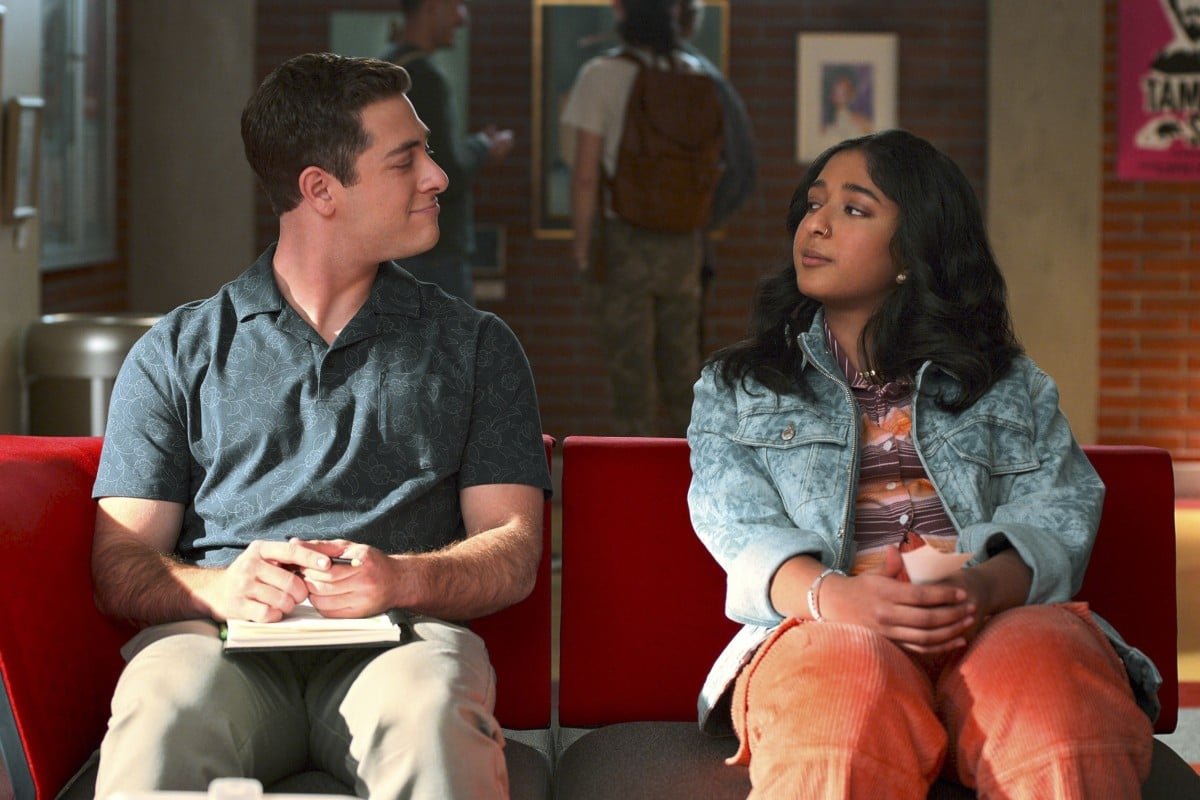
‘Never Have I Ever’ season 4 review: Netflix’s coming-of-age comedy has a satisfying ending that shows Devi’s growth through trauma
- Canadian actress Maitreyi Ramakrishnan stars in this series, created by Mindy Kaling, that follows an Indian-American teen navigating life after the death of her father
- Show has been praised for South Asian representation and showcasing struggles with identity and family

 Jaren Lewison and Maitreyi Ramakrishnan star as Ben and Devi in “Never Have I Ever”. Photo: Netflix
Jaren Lewison and Maitreyi Ramakrishnan star as Ben and Devi in “Never Have I Ever”. Photo: NetflixThe hit Netflix comedy-drama Never Have I Ever released its fourth and final season earlier this month, providing a long-awaited resolution to its fans. The show centres around Devi Vishwakumar (played by Maitreyi Ramakrishnan), an Indian-American teen in California. After her father’s death, Devi tries to balance her trauma while undergoing standard teenage dilemmas, such as academics, social life, family and mental health.
Creator and producer Mindy Kaling (The Office, The Mindy Project) was inspired to write the show after her mother died of cancer in 2012. “Losing my mom and then wanting to talk about it in a way that is not as sad as the experience of going through it, but being able to be like, ‘If you went through anything like this, you could watch this and feel seen’ – I think that was the goal,” Kaling said in an interview with Marie Claire in 2022.
The 7 best TV shows of 2022: Wednesday, Ms Marvel and Spy x Family kept us glued to our screens
The previous season’s finale involved Devi turning down an opportunity to study at an esteemed boarding school to have one more year with her loved ones before college. Now, Devi is focused on academics and getting into her dream university, Princeton. However, she is also intent on having fun with her friends, developing her love life, and making memories.
The most significant achievement this season was Devi’s maturity. She was always hot-tempered, but it became more difficult for her to rein in her emotions after her father’s death. As such, Devi’s story was often rooted in friction, thanks to her outbursts and impulsive decisions. However, Devi has made huge strides and learned to tackle conflict more maturely. Instead of acting out, she has learned to communicate with others and accept what comes her way. It’s encouraging to see how Devi grows through the series, and the audience feels like they grew up alongside her.
This growth can be seen through her conflict with Fabiola (Lee Rodriguez) after she applies to Princeton, her competition with Eleanor (Ramona Young) over a boy, the way she encourages her mother to date, and her reaction to her crush rejecting her. This character development shows Devi has finally made peace with her trauma and helps her form stronger bonds with her loved ones.
The final season also wraps up the love triangle that’s guided the series: the one between Devi, Ben and Paxton.
Former academic rivals Ben (Jaren Lewison) and Devi have come a long way since the first season. They can rely on each other, even when they aren’t talking, such as when Devi gives Ben her shirt after he spills paint on his or when Ben defends Devi from an inappropriate man at a party.
While Paxton (Darren Barnet) and Devi had a dynamic, opposites-attract relationship, Ben and Devi’s bond has years of history, and it’s heartwarming to see how both storylines end.
The series is also noteworthy for its inclusion of Indian culture. Race and heritage play a prominent role in the show as Devi grows up shunning her Indian roots. But the portrayal of Indian culture this season represents how Devi is healing this inner conflict and becoming more appreciative of her roots. We see this in the final episode when Devi and her cousin Kamala (Richa Moorjani) perform an Indian dance together. It’s an inspiring moment that shows immigrant kids the beauty of staying in touch with their culture.
Since this season focused on Devi’s development, some characters’ stories did not receive a satisfying resolution. Aneesa (Megan Suri) got the shortest end of this stick. The two had grown to be friends, and she was an impactful character who provided bisexual representation and exposed how society can pit women against one another. It was disappointing to see Aneesa’s future revealed in a simple throw-off line while she was reduced to a few background scenes. Instead of cutting these characters short, writers should have made the season longer to have enough time to fully develop their conclusions.
8 inspiring, touching, and all around hilarious Bollywood films for beginners
Nevertheless, most characters get their happy ending. Fabiola and Eleanor follow their respective passions in robotics and acting, and Devi’s mother (Poorna Jagannathan) and grandmother (Ranjita Chakravarty) realise they don’t have to give up on love. The brilliant Kamala makes some major career and relationship moves. Paxton sheds his former jock persona and figures out his ambitions, while Ben learns to humble himself as he enters university.
The final season shows it was worth sticking with Devi through all the ups and downs as she rode the roller coaster of adolescence and grew into a mature young woman. The show’s success in connecting audiences across gender, race and age will resonate with viewers for a lifetime.
